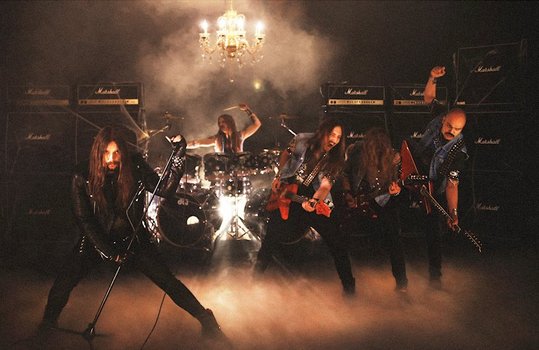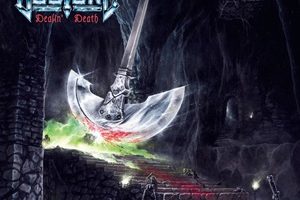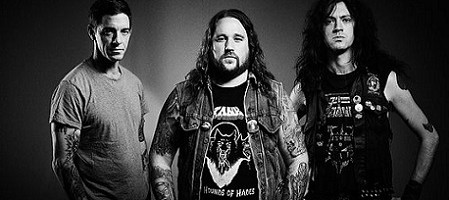Vulture – Running with the Phantom
Sunday, 16th May 2021
Rich in 80’s themes of speed, thrash, and horror, German act Vulture live and breathe for heavy metal. The imagery, the lyrical content, the passion for the genre all come through their three albums – of which the latest Dealin’ Death continues their hot streak. Between the shrieking voice of Leo Steeler and thick rhythms plus pounding bass/drums, the band take on influences from both sides of Europe and North America to capture a sound that makes headbanging mandatory, fists fly high to the sky, and allow alcohol sales to rise when hearing these songs in a live setting.
We reached out to guitarist Stefan Castevet who quickly brought us up to speed on the latest Vulture activities. You’ll learn more about how the band distinguish their sound in today’s scene, the importance of imagery and cover art to their overall product, favorite memories to date, thoughts on the German metal scene, and how work has already begun on the follow-up while waiting for the pandemic to clear.
Dead Rhetoric: Dealin’ Death is the latest and third Vulture album – how did the songwriting and recording sessions go for this effort, and where do you see the major differences between this record and your previous discography?
Stefan Castevet: Songwriting was pretty smooth this time. We went in with a clear mind, no pressure as far as performance-wise. We were fine with ourselves and literally wrote songs that we thought sounded great. That’s the biggest difference between Dealin’ Death and Ghastly Waves & Battered Graves which was written over a six-month period. We felt like we had to perform, and it resulted in very complex songs with very complex structures and a bit over the top here and there.
The recordings were happily not that much affected by the pandemic, since we recorded everything before the first measures were in place here in Germany. We were lucky to pick the right period last year. Two or three weeks later it would not have been possible to record an album.
Dead Rhetoric: You mention in the background information that it’s not easy to keep thrash metal fresh in 2021. What are the things to consider when developing the material, staying true to the ideals of Vulture, and also make something that does sound interesting for yourselves as well as the listeners?
Castevet: First of all, it’s important to find your own niche, where you feel comfortable on the one side and doing your own thing on the other side. I think we found that years ago, already, and now are able to move back and forth, left and right in that niche. Get all our different influences in there, not only try to be as fresh as we can but also elements from the classical, retro-metal background. That’s where we feel very comfortable with. That may be the key when we talk about stuff like thrash metal to be fresh. I like the old school movement as well, and other bands that pay homage to some degree. But in order to keep it fresh as you say, you have to put in your own elements and I would say we do that with some structure moments, some trademark riffing here and there, we know how to sound like Vulture.
Dead Rhetoric: I would guess that’s where you place emphasis on the keyboards and the horror elements to make things unique, right?
Castevet: Yes, that’s one of our trademarks. We try to not only use this horror vibe thing as intros but also use choirs here and there, synth elements to spice it up and create some drama and theatrical things that are the opposite of the usual thrashing that we do.
Dead Rhetoric: Were there any songs that came easier than others – or ones that presented more of a challenge on the new record?
Castevet: The most difficult one on guitar for me was “Star-Crossed City”, a huge pain in the ass. I don’t know, the tempo didn’t feel right for my right hand and I couldn’t get things right for striking the strings or should I be down picking the whole time. It took a lot of time for me. Songwriting-wise, everything felt very natural. “Flee the Phantom” is a song that took longer to write, because it was the first one where we didn’t have the proper approach to how this record was going to be in that early stage. I think that was the toughest one for us.
Dead Rhetoric: Keeping the lyrical content focused on horror and mythology angles – including the works of Edgar Allan Poe and Medusa from Greek mythology for specific songs – do you believe that these subjects are ideal for the metal genre, and have you personally always been a fan of the horror/suspense genre in terms of stories, books, movies, etc.?
Castevet: I guess they are perfect for us. That whole thrash genre has a lot of different topics that people sing about. Political, satanic things. We have chosen this path and we feel very comfortable with it. Yes, we’ve always been into horror movies, due to the fact that we love singing about this, we of course have pressure to put in more movies and read some more stories. Our interest in horror and drama elements got bigger and bigger the more that we played in Vulture.
Dead Rhetoric: Considering the distance factor between members and your rehearsal schedule that you incorporate – I would imagine that even with the pandemic taking place, this really didn’t affect your ability to work on this material remotely, correct? Do you enjoy the tools of the internet to go at your own pace and put things together in this personal way?
Castevet: You have that right. Yes, our songwriting has not been affected at all, because we write everything from home. We pre-record as much as we can from home as much as possible. Right now we are happy to be creative. We don’t write anything in the rehearsal room. Dealin’ Death is going to be out a month from now, and we’ve already got four new tracks done! (laughs) We’ve got a lot of time on our hands, a lot of guitars in our hands right now and we are happy to be creative. We try to make the best out of it.
Dead Rhetoric: Do you feel things are different in Vulture compared to earlier bands where you worked together as a band – or have you always felt comfortable working on your songwriting with the tools at your disposal?
Castevet: The distance between (us) is one factor in the way we approach songwriting, especially for me. As a songwriter I’ve always done things this way. I’ve always felt more comfortable at home and let the ideas flow by myself. I have the time to write the ideas down and rearrange stuff. I’ve never written stuff in the rehearsal room.
Dead Rhetoric: Do you believe your abilities as a drummer and guitarist help shape a different picture when it comes to your songwriting for Vulture – because you are not just looking at things from one angle?
Castevet: Definitely. Even though I haven’t touched a drum kit for four years now. Of course, I know what a drummer should do here and there, know the patterns and what could be best. Writing music down in certain programs and sending it across so we don’t record every riff we do, but rather tap it. In Guitar Pro we can change up the tempos, it’s pretty much the stuff that ends up on the record in the end.
Dead Rhetoric: Who do you look to for inspiration as far as your guitar playing? Do you think your abilities have changed over the years?
Castevet: I’m not so much into the guitar hero thing. Ever since I started I was more into riffs and bands than solos and people. I’m more a riff guy rather than saying Yngwie Malmsteen is the best and I want to play like him. That does nothing for me. Riff-wise I love the two Slayer guys, Mike from Destruction has had a huge influence on me.
Dead Rhetoric: How would you describe the relationship and outlook Vulture has with Metal Blade now that you’ve been with them for a few years? Do you believe the staff have the proper understanding and culture that go hand in hand with Vulture?
Castevet: Definitely. Andreas, the A&R person that is responsible for us at Metal Blade, he lives a kilometer away from my flat and we are good friends. We meet each other when it’s possible, and we have the same tastes in music and know how speed and thrash metal is supposed to sound like. It’s the perfect combination, a great match and we are happy to have that. I think it would be very hard to be on a label where you have a certain idea and somehow end up on a successful label like Metal Blade yet have some guy at the end of the desk that doesn’t get the point you are having. We are very happy this is not the case for Vulture – we were afraid of this at first when we joined Metal Blade, that they wouldn’t get the underground feeling where we are coming from.
Dead Rhetoric: Were you also concerned when you went to Metal Blade of some of the underground following you established turning their backs because of signing to a bigger label? Or do most of the fans realize you haven’t changed in style, just gained more of a promotional arm in the scene?
Castevet: We were definitely afraid of that. I think that also happened, there were some real maniacs that thought that we were sell outs. But in the end, we said who is going to decide on what we are going to do? It should be us. Fear is never good advice. We had that in mind, but we are not going to fall on that and just decided to go for it. If you look at Metal Blade’s past, what they have created in which aspects they were the first, it’s such a legendary label. It’s the perfect fit for us in the end. Of course, there are a lot of modern bands on the label, stuff that doesn’t fit our idea of heavy metal. But in the end, these (labels) are the ones paying the bills, not Vulture! (laughs)
Dead Rhetoric: And how important has imagery and cover art been to portraying Vulture?
Castevet: Ever since we started, it was important right away. In the end it sounds very unromantic, but we are a product as a band, and you want the whole package. We have to stick to the faces we’ve been born with, but everything else we are in control of. The way we get on stage, the way our artwork looks, the sound, our pictures, and layouts. We talk about everything, all elements get the same priority. Every band should do this, I think.
Dead Rhetoric: What do you believe separates the newer generation of speed, thrash, and traditional-minded heavy metal bands from the original pioneers? Do you believe it’s tougher for newer bands to break through to gain a bigger fanbase even with the self-promotion tools of social media and instant communication technology at your disposal?
Castevet: I don’t think the genre we are playing in is going to be a genre that will finance people’s lives. I’m getting the point why – we want to sound like the 80’s, we want to look 80’s, there’s not a lot of fresh stuff in that niche. On the other side, when Slayer is touring, who is supporting Slayer? Trivium. If like Slayer would tour with Aura Noir or Necromantia, people would be more likely to look into the underground on their own that don’t get the fanbase they deserve. That’s also because the touring packages are pretty strange.
Dead Rhetoric: What have been some of the best memories to date for Vulture – specific records, shows, festivals, tours, or other events where you knew something special was going on and you were making an impact with your work and music?
Castevet: I think the first responses we ever got as a band are the most exciting for me because we didn’t expect the amount of response that we got. That was something very special, and we created something that could be good. I think concert-wise, and things we went through together, my favorite concert was in Gothenburg, Sweden when we played the Abyss festival. This was the second show with Gereon, and I had the feeling that the crowd was waiting for us. That’s the first time I ever had that feeling. Everybody was singing along, smashing their heads, and that was something that was really energetic. The same feeling when we went to London, I had never been to England before. That was so amazing, the show was amazing. These are the memories that are the most emotional for me.
Dead Rhetoric: How do you feel about the German metal scene at this point – as many people view this as the strongest in mainland Europe for tours, festivals, bands, etc.?
Castevet: We have a huge scene. The festivals you talked about – when there is not a pandemic and there is at least a little bit of sunlight, there is a metal festival almost every weekend. Almost to the point where it’s a little bit too much, I think. The amount of shows are so high. There are a lot of great young bands, and a lot of older bands that are still around. As a metal head and a metal musician, you can be very happy to be born in Germany.
Dead Rhetoric: What are some common mistakes or missteps that you see younger bands making in the metal genre that you think they need to avoid? And how have you personally handled setbacks or mistakes that may have happened within Vulture or earlier bands as you were working your way up the scene?
Castevet: I think before you start a band, before you really get your first release or put your first song online, you need to be sure and have a complete concept of what you are trying to be and what you want to sound like. I don’t get the idea of bands that do a demo and say ‘this is just a demo – we will get a proper sound on the record.’ The first impression is the most important impression, no matter the medium you choose. We did these mistakes too – in other bands before Vulture. We learn from it well, and we had a great start with Vulture. Here and there we took some approaches that didn’t feel right after some time. You just have to keep going. Keep on learning from mistakes and talking about stuff. I think there’s nothing more deadly for a band than to stop talking and stop being critical of yourselves. That is something that you should do all the time.
Dead Rhetoric: Do you believe band chemistry and friendships are important in today’s scene?
Castevet: Yes, of course. You just mentioned earlier that we live very far apart from each other. To a point where we have talked about last year since everyone is stuck in jobs, no friends/families – there are times where we see each other when there is band business to handle. That friendship is something that should not be underestimated and a key part for a functioning band. If you are not friends, you should not do music together.
Dead Rhetoric: How do you balance out the activities of Vulture with the day jobs/careers and family life? Do you ever hope to be able to make a living solely from your activities with the band, or is that realistic in today’s marketplace to achieve?
Castevet: That is completely unrealistic and also a privilege to earn your bread from music alone. I’m very happy to say this is my creative output and not the stuff that I have to earn money and I’m forced to write a record every two years. I want to write music every two years. On that side, we will never be able to make a living out of music but of course I would lie if I would say it wasn’t a silent childhood dream to be a musician and that’s it.
Dead Rhetoric: How do you see the next year shaping up for Vulture activities to promote the new record? And do you have any predictions for how the metal scene will be once live concerts and festivals return?
Castevet: I hope everybody will return hungry! Like I just said before, there are so many concerts here, you may have to think about is it worth it to miss one. Once this thing is over, no shows may be missed out in the first half of the year. We are happy to plan stuff out, but so far let’s stay safe, we can’t do anything right now. We have some ideas and have had offers for next year, they could happen and it would be amazing.
Maybe we will annoy people and drop a new record next year! (laughs). I don’t know. I could finish a new record with my time management, but we will take our time at everyone’s own tempo.
























